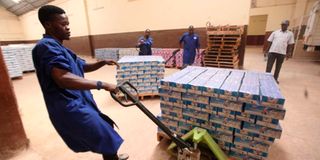Local traders cry foul as Kenya-Uganda milk row intensifies

Workers arrange cartons of Lato milk products in Kisumu on January 17, 2020.
Traders in the Central Rift and parts of Western Kenya have decried the Kenya Dairy Board's blockade of milk imports from Uganda.
The traders, who until March stocked mostly long-life milk imported from Uganda, said the impasse over the movement of dairy products from Kampala had affected their operating margins as customers continued to ask when milk from the neighbouring country would be available.
Kenya was the leading buyer of Ugandan milk, with imports valued at $138.2 million (Sh19.2 billion). In 2019, the value of Uganda's milk exports to Kenya was much higher, with a World Bank report putting the value at USD 721 million (Sh100 billion) for a total of 158 tonnes of the commodity.
There have been constant calls from both the industry and political leaders for the government to ban Ugandan milk because it is cheaper and undercuts Kenyan products in the market.
Kenya is Uganda's main milk market, but the constant barriers have prompted the search for wider markets, particularly in the Democratic Republic of Congo, South Sudan, Zambia and Algeria.
Processed milk accounts for more than 35 per cent of Uganda's marketed milk, according to Uganda's sector regulator, the Dairy Development Authority.
“Dairy products from Uganda are relatively cheaper compared to local brands due to the lower costs of production there. Consumers are asking why we no longer stock these products, but we are not receiving any supplies from Kampala,” said Mr Edwin Ngala, a wholesale stockiest in Bondeni, in Nakuru City.
“I have another outlet in Ahero, Kisumu County and the situation is the same. Stock-outs of milk from Uganda,” Mr Ngala added.
In March, the Kenya Dairy Board (KDB) stopped issuing permits for Ugandan dairy products in the Ken Trade system, despite a notice banning dairy imports issued by the same regulator having been rescinded by the Principal Secretary, State Department for Livestock Development.
A spot check in Nakuru showed that major outlets were not stocking any milk from the neighbouring country.
“For two months, popular brands like Fresh Dairy and Lato have been in short supply,” a shop attendant at one of the supermarkets in the central business district said in confidence as he is not allowed to speak on behalf of the retail chain.
Dairy processors in Uganda are said to be holding more than 24 million litres of milk following the import blockade imposed by the KDB.
According to media reports in Uganda, the processors, who include Brookside whose parent company is Kenya’s Brookside Dairy, said the impasse had impacted farm gate prices of milk on the back of current heavy rains in the neighbouring country, which had led to a rise in milk volumes.
Mr. Benson Mwangi, the general manager of Brookside Uganda was last week quoted by the Daily Monitor saying they had not exported a litre of milk ever since KDB started withholding their export permits.
“We continue to grapple with non-issuance of export permits by the Kenya Dairy Board,” Mr Mwangi is quoted by the publication.
Uganda’s industry regulator, the Dairy Development Authority (DDA) says Kenyan authorities are limiting the number of export permits for milk from the country.
DDA executive director Samson Akankiza told journalists that Nairobi is only issuing about 20 percent of entry papers to exporters of its powdered milk.
There are also reports in the industry circles that Kenya is committed to resolving the matter of denial of milk export permits for Uganda, and that the blockade will be “amicably addressed in the next few days.”





